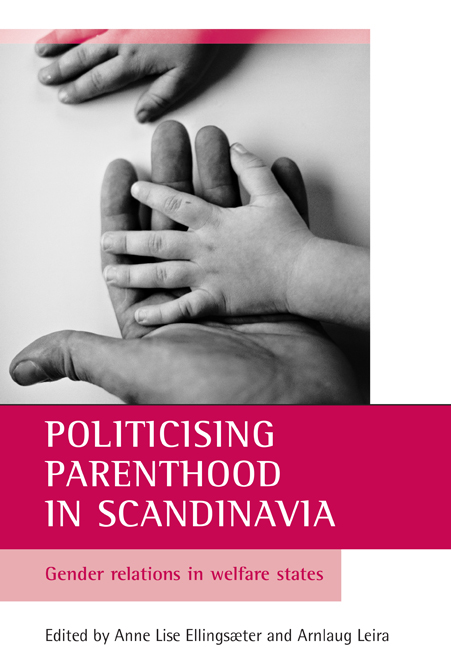Book contents
- Frontmatter
- Contents
- List of boxes, figures and tables
- Acknowledgements
- List of contributors
- one Introduction: politicising parenthood in Scandinavia
- Part One Politicising parenthood – legacies and challenges
- Part Two Gender equality and parental choice in welfare state redesign
- Part Three Work, family and the welfare state: redefining family models
- Index
two - Parenthood change and policy reform in Scandinavia, 1970s-2000s
Published online by Cambridge University Press: 15 January 2022
- Frontmatter
- Contents
- List of boxes, figures and tables
- Acknowledgements
- List of contributors
- one Introduction: politicising parenthood in Scandinavia
- Part One Politicising parenthood – legacies and challenges
- Part Two Gender equality and parental choice in welfare state redesign
- Part Three Work, family and the welfare state: redefining family models
- Index
Summary
Work/family policies to promote gender equality are widely regarded as a Scandinavian trademark, and the institutional, universally oriented, social democratic welfare state is commonly presented as the driving force behind family change (Hernes, 1987; Esping-Andersen, 1999; Korpi, 2000). In the 1980s, the Nordic family was pictured as ‘going public’, the outcome of a grand political experiment to support new family arrangements. Mothers and fathers of the public family were both in paid work, while the ‘caring state’ provided day care services for children. Critical voices claimed that the welfare state was disrupting traditional family values and family solidarity (for example, Popenoe, 1988; Wolfe, 1989). In Helga Hernes’ interpretation, however, work/family policies illustrated the ‘woman-friendly’ potentialities of the Nordic social democracies, enabling women ‘to have a natural relationship to their children, their work and public life’ (1987, p 15).
Welfare state typologies of the 1990s have added to the interventionist picture, placing social democratic Scandinavia as the more ‘defamilising’ (Esping-Andersen, 1999; Korpi, 2000). In Gøsta Esping-Andersen's analysis, social democracies differ from liberal and conservative welfare states in providing more services and benefits for families and households, and therefore in lessening the burdens on families. Unlike the conservative model, in which childcare arrangements are the responsibility of the family, and the liberal, which opts for a marketisation of services, the social democratic welfare state is sponsoring defamilised social, welfare and care services that facilitate the employment of women. Esping-Andersen (2002, p 20) further endorses Hernes’ assessment of the qualities of Scandinavian reproduction policies, and takes woman-friendliness and gender equality as the main challenges for welfare state reform.
Implicit in the terms ‘public family’ and ‘defamilising welfare state’ is the assumption that it is the state that initiates the redesign of motherhood and childhood (fatherhood change is less noticed). However, the interplay of family change and policy reform deserves more attention (Leira, 2002). It is important to keep in mind that social and cultural redesign of parental practices, on the one hand, and on the other, political reconceptualisation of the mother–child and father–child relationship are not always synchronised. Family change has often preceded policy reform (Leira, 2002). The stated aims of parenthood policies do not always come to fruition, or policies may conflict. Unintended effects do occur.
- Type
- Chapter
- Information
- Politicising Parenthood in ScandinaviaGender Relations in Welfare States, pp. 27 - 52Publisher: Bristol University PressPrint publication year: 2006
- 3
- Cited by



